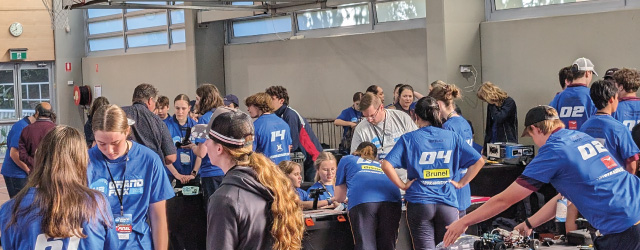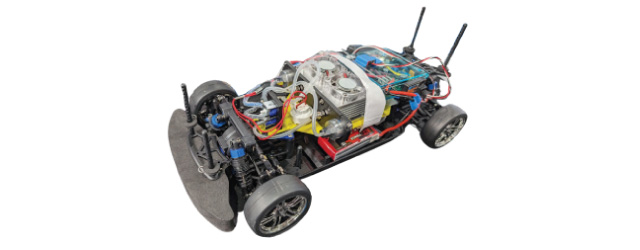The hydrogen race inspiring tomorrow’s energy specialists
renewable energy

renewable energy
Brunel cheered on Fairholme College at this year’s Horizon Hydrogen Grand Prix (H2GP), an event where students are challenged to build, optimise and race their own hydrogen-powered RC car. Fairholme were one of 16 teams participating in the Southeast Queensland regional qualifying event on the Gold Coast – and managed to snag bronze and book themselves a trip to the California world finals in their very first race!
The H2GP Challenge was created to showcase hydrogen fuel cell technology, providing participating schools with science kits that enable students to construct their own hydrogen powered RC vehicle. Over the course of several months, students build their knowledge by undertaking a series of hands on science experiments before building and then systematically refining the performance of their own vehicle.
In addition to the fostering teamwork, the H2GP pushes participants to grapple with the same fuel efficiency challenges faced by real world clean-energy operations – and in doing so, seeks to inspire the next generation of energy professionals.
Fairholme College’s H2GP team is made up by eight passionate year 10 and 11 students, who, with the guidance of the school’s Teacher of Sciences Andy Cockerill, spent many afternoons and lunch breaks racing and refining the car they affectionately dubbed the H2fxlcon. ‘X’ as a nod to both the unknown variable in math equations and the female chromosome, and falcons for their speed.
Working closely with the team, Andy Cockerill observed “The students loved learning about renewable energy sources and were able to understand how aspects of that work significantly more by applying it directly with the remote-controlled car. They could actively figure out what the parts do and problem solve, which they thoroughly enjoyed.”

The Fairholme team would prove to be one of relatively few all-female teams in the challenge – something which helped attract the interest of Brunel Regional Manager ANZ Querida Swinnerton.
“Engineering, scientific and highly-technical professions are at the heart of what Brunel is, so the opportunity to support an all-girls team to engage with renewable energy technology was a natural alignment for us,” Ms Swinnerton said.
“Fairholme College’s focus on nurturing confident, independent women and challenging gendered career stereotypes also make them a perfect partner when it comes to encouraging greater female participation in STEM professions.”
Alex Kuhn from the Fairholme team remarked “The experience has made me feel more empowered about being a woman in STEM. It has really helped me realise that women can do the same things as men – and get good results.”

H2GP races are a test of efficiency rather than speed – so instead of outrunning their competition, teams focus on completing more laps than their opponents over a gruelling 4-hour test of endurance with limited fuel and battery changes. The Fairholme team focused on weight reduction, swapping out the stock battery for a smaller model while also slicing away non-structural parts from the car’s base.
Where did the Fairholme team focus their attention? On training weight; they opted for a smaller battery, cutting away non-structural parts of the car’s base. On a practice lap before the race, the team were confronted with a nerve-wracking stumbling block: a steering issue with the H2Fxlcon. However, the team rallied, performing pre-race repairs to fix the car in time for the starting flag.
Despite the relatively long race time, the Gold Coast qualifier delivered plenty of action with many impacts sending cars to the pits for repair, and the Fairholme team were from far immune. When the H2fxlcon’s chassis and front wheel caught together during the warm-up lap, it looked like Fairholme’s race may have been over before it even began, but the team rallied, performing prerace repairs to ensure the car made it to the starting line.

Fairholme worked steadily on the big picture over the 4-hour marathon, maintaining a top five position for most of the race, hoping to outlast some their faster competitors. As the race entered its final hour this strategy began to pay dividends, with teams progressively withdrawing as they exhausted their hydrogen supply.
With just 10 minutes remaining, the H2fxlcon passed the 400 lap mark and in a testament to the their teamwork, resilience and hard work, finished in third place with 427 laps, behind Palmerston at 509 laps and SERT Kingaroy at 542. An outstanding result for the Fairholme team’s first race and enough to qualify for the world finals!
The team will travel to the H2GP World Finals in Anaheim in September to show the rest of the world what Toowoomba – and girls with a passion for STEM – are capable of. GO TEAM FAIRHOLME!
Melbourne
40 hrs a week
October 05, 2024
Eight Mile Plains
40 hrs a week
October 01, 2024
Melbourne
40 hrs a week
September 30, 2024
Melbourne
40 hrs a week
September 20, 2024